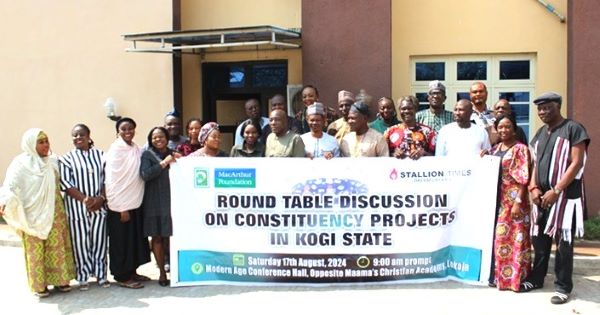At a recent roundtable discussion on constituency projects held in Lokoja, stakeholders called on state and federal legislators to establish and maintain functional constituency offices.
By Lukman Abdulmalik
This demand was one of the key resolutions outlined in a communique signed by Amb. Idris Ozovehe Muraina, Chairman of the Kogi Accountability Platform, interim Chairman Hamza Aliyu, and Stallion Times Project Coordinator, Isiyaku Ahmed.
The roundtable, organized by Stallion Times at Modern Age Conference Hall in Lokoja on Saturday, was part of the “Get Involved, Dialogue, and Improve” (G-DRIP) initiative. This three-year participatory governance and media literacy project aims to encourage effective citizen participation in governance to enhance service delivery.
G-DRIP is supported by the Wole Soyinka Center for Investigative Journalism under the Collaborative Media Project, with funding from the MacArthur Foundation.
The communique highlighted that many elected representatives lack functional constituency offices, which limits engagement with their constituents. It also noted that constituents are often not included in the planning and conceptualization of constituency projects. Additionally, civil society and community members in the state have not sufficiently monitored the conceptualization and implementation of these projects.
Citizens’ dissatisfaction with their elected representatives stems from a lack of transparency, particularly regarding the expenditure of public funds. The Kogi State Government has implemented processes and procedures for developing evidence-based instruments to provide amenities based on community needs.
However, the personalization of requests by citizens during engagements with elected representatives has made it challenging to hold public officeholders accountable.
The communique further emphasized that every elected representative must have a functional constituency office equipped with the necessary staff and resources. The legislature must establish mechanisms to ensure that the concept of constituency projects is transparent and accountable to the public through oversight and public accounts investigations.
Anti-corruption agencies like the Independent Corrupt Practices Commission (ICPC) and the Economic and Financial Crimes Commission (EFCC) should intensify their scrutiny of constituency projects in Kogi State.
Citizens must take an active interest in public sector budgeting, budget tracking, legislative advocacy, and policy engagement. Constituents should view constituency projects as their own and take responsibility for guarding and protecting them.
The roundtable highlighted the importance of citizen engagement in planning and initiating constituency projects in Kogi State.
The event brought together Civil Society Organizations (CSOs), Faith-Based Organizations (FBOs), Persons with Disabilities (PWDs), the Kogi State Open Government Partnership (OGP), state and non-state actors, and the media.


